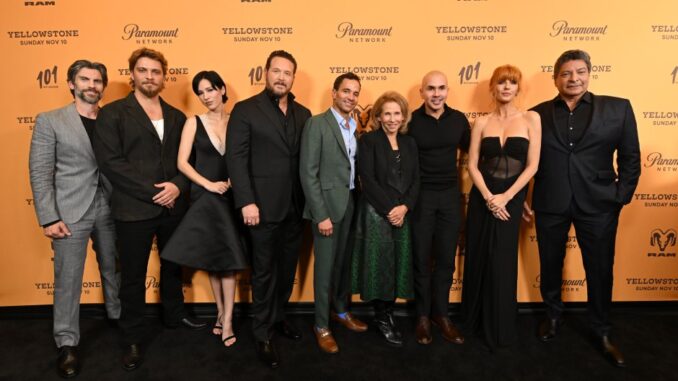
The Ember and the Ash: What to Expect from a Yellowstone Sequel Series
The dust hasn't even settled on the Dutton ranch from the seismic events of Yellowstone Season 5, yet the horizon already shimmers with the promise of a sequel. With the impending departure of Kevin Costner's John Dutton and the show's main arc drawing to a close, a follow-up series isn't merely a possibility; it's a necessity, a continuation of a story too vast and too vital to simply conclude. But what can we, the devoted faithful, truly expect from this new chapter? It won't be a mere rehash, but a necessary evolution, a tale forged in the ashes of the past, still carrying the embers of its fiery spirit.
Firstly, we must brace ourselves for the shifting of the throne, or perhaps, its splintering. The shadow of John Dutton has loomed large over the entire Yellowstone saga, a patriarchal monolith against which all conflicts, alliances, and betrayals were measured. His likely exit, whether by death, incapacitation, or reluctant abdication, will create a vacuum, a void that no single character can fully fill. Expect a power struggle, not necessarily for the ranch itself, but for the very definition of the Dutton legacy. Will Beth, a coiled viper of loyalty and rage, assume the mantle, wielding her father's ruthlessness but perhaps lacking his grounded pragmatism? Will Kayce, perpetually torn between worlds, finally embrace the land and its burdens, or will he seek a different path, perhaps one of quieter, more strategic defense? And what of Rip, the steadfast enforcer, whose loyalty defines him? His leadership would be by brute force and unwavering devotion, a stark contrast to John's nuanced political maneuvering. The sequel will likely explore a fractured leadership, where the fight for the ranch isn't just external, but deeply internal, forcing these characters to define themselves beyond John's shadow.
Secondly, the sequel series will undoubtedly present an evolving war for the land. The threats faced by the Duttons in Yellowstone have, until now, largely revolved around corporate titans like Market Equities and the political machinations of state government. While these elements will undoubtedly persist, expect the sequel to broaden the scope of conflict, reflecting more contemporary and complex challenges. Water rights in an increasingly arid West, the escalating demands of eco-tourism, the impact of climate change on ranching, and perhaps even the rising tide of ideological extremism could all become formidable adversaries. The battles may shift from shotgun blasts and courthouse brawls to digital warfare, land-use legislation, and public opinion campaigns. The enemy may no longer be a singular, identifiable CEO, but a faceless system, a growing urban sprawl, or an environmental crisis that threatens not just the ranch, but an entire way of life. This new conflict will demand more than sheer will; it will require adaptability, strategic alliances, and perhaps, a willingness to compromise on certain sacred cows.
Thirdly, prepare for a deeper exploration of identity and heritage. With John Dutton's potential absence, the question "What does it mean to be a Dutton?" will take center stage. Is it merely about owning the largest contiguous ranch in the United States, or is it about preserving a dying American ideal? The sequel will be forced to grapple with the contradictions inherent in the Dutton legacy: the simultaneous pursuit of justice and the occasional embrace of lawlessness, the love for the land and the violent defense of its boundaries. We might see a younger generation, perhaps even Tate, coming of age and questioning the brutal methods of their forebears, seeking a different path to preservation. The relationship with the Broken Rock Reservation, always a complex dance of conflict and uneasy alliance, could evolve into a more definitive partnership, recognizing a shared interest in land stewardship and cultural survival. The sequel, free from the immediate pressures of John's presence, can delve into the philosophical underpinnings of the Yellowstone universe, asking whether a traditional way of life can truly survive in a modern, ever-changing world.
Finally, while the canvas will be new, expect familiar echoes and enduring themes. The breathtaking cinematography of Montana's vast landscapes will remain, a constant character in itself. The raw, often poetic dialogue that defines Taylor Sheridan's storytelling will persist, as will the morally ambiguous choices that force viewers to confront their own definitions of right and wrong. The bunkhouse banter, the visceral violence born of desperation, the unwavering loyalty of the ranch hands, and the palpable sense of family, however dysfunctional, will undoubtedly carry over. The sequel won't abandon its roots; it will build upon them, perhaps introducing new characters who embody similar archetypes – the ambitious outsider, the conflicted insider, the loyal but flawed protector – but facing them with fresh dilemmas. It will be the same beating heart, just in a new, perhaps more weary, but equally resolute body.
A Yellowstone sequel series will not be a comforting return to the familiar, but a daring step into an uncertain future. It will be a testament to the enduring power of land, legacy, and the complex ties that bind family. Expect loss, expect new challenges, expect internal strife, but above all, expect a narrative that honors the grit, passion, and uncompromising spirit that made the original so compelling, proving that even as the ash settles, the embers of the Dutton story continue to glow, fiercely, defiantly, in the Montana night.
